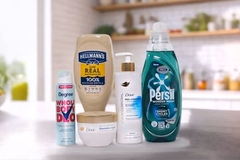Nigeria FDA seizes counterfeit cosmetics masked behind military markets
Key takeaways
- Nigeria’s NAFDAC has confiscated US$335,000 worth of fake cosmetics.
- The counterfeiters import or reproduce the containers, refill them with fake creams, and sell them on mammy markets.
- Counterfeit cosmetics often contain ingredients harmful to human health.

Nigeria’s National Agency for Food and Drug Administration and Control (NAFDAC) has urged caution on counterfeit cosmetics after a raid seized ₦500 million (US$335,000) worth of illegal cosmetics.
“Our enforcement team got an alert that some people are hiding inside one of the military markets — a mammy market for faking genuinely recognized cosmetics. They simply reproduce the containers and refill them with fake cream or lotions,” says the organization’s director of Investigation and Enforcement, Dr. Martins Iluyomade.
Traditionally, “mammy markets” began as stalls run by soldiers’ wives, hence the word mammy. They provided food, household items, and personal goods for soldiers and their families.

Over time, the markets expanded to sell various consumer products, including cosmetics, clothing, electronics, and groceries. The markets’ association with the military creates a reputation for safety and authenticity, as people often believe goods sold there are more genuine than in informal street markets.
Counterfeiters can exploit the trust consumers place in these spaces, making it easier to sell fake products without raising suspicion.
“Because [the counterfeiters] know that mammy markets are mostly known for genuine products, they hide inside the market to produce fake cosmetics,” Iluyomade says.
According to him, counterfeit producers import empty containers for refilling.
Rise of risks
Counterfeit cosmetics pose multiple public health threats, as they often contain illegal, unverified, or harmful levels of cosmetic ingredients.
“Counterfeiters do not care about consumer health or safety — full stop. Their sole objective is profit. Any measure ensuring product safety usually involves additional costs that cut their margins. Since these operators already operate outside the law by violating intellectual property rights, they disregard health and safety regulations similarly,” the OECD previously told Personal Care Insights.
Nigeria, in particular, has fought an exceptionally long battle against unsafe skin care. The country ranks as one of the top demanders for skin-lightening and skin-bleaching products.
.jpg) The counterfeiters import or reproduce the containers, refill them with fake creams, and sell them on informal markets.Nigeria’s minister of state for Health and Social Welfare, Iziaq Salako, attributes this demand to “societal norms and colonial influences that promote lighter skin as a standard of beauty.”
The counterfeiters import or reproduce the containers, refill them with fake creams, and sell them on informal markets.Nigeria’s minister of state for Health and Social Welfare, Iziaq Salako, attributes this demand to “societal norms and colonial influences that promote lighter skin as a standard of beauty.”
While the skin-lightening products used are often highly efficacious, probes have found that it is mercury’s presence in the formulations that makes them work. The neurotoxin inhibits melanin production and makes the skin appear fairer within days, but use leads to kidney damage, nervous system disorders, psychosis, neurological damage, and severe skin reactions.
At the intersection of counterfeit and toxin-laced cosmetics, Nigeria launched a QR strategy in June this year so consumers can verify that products are real and track movements through the supply chain.
The move aims to increase public safety, however, in the same month, we were told that cosmetics containing mercury are often “purposefully mislabeled” with “natural,” “herbal,” or “safe for use” claims.
Tracking a product’s origins may significantly decrease health risks from counterfeiting, but expensive technical equipment is ultimately necessary to detect harmful ingredients.
Yet, as Personal Care Insights previously reported, mercury-tainted and fake products are often most in demand in lower-income regions where limited government resources make enforcement weak.
Nigeria’s Federal Competition and Consumer Protection Commission told us: “At a time when both consumers and businesses are experiencing economic challenges, getting value for money expended on products has become imperative.”













